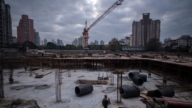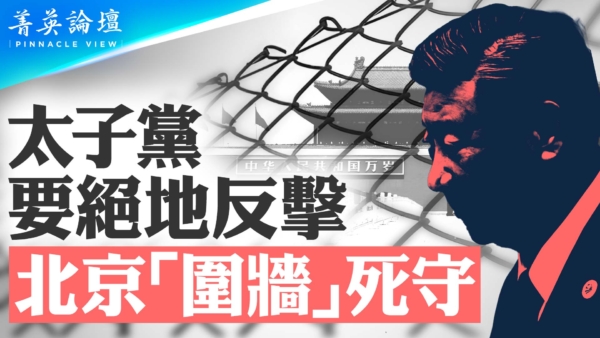【新唐人2012年11月10日訊】中共十八大會議開幕當天,大陸股市開低走低,直到9號仍然以跌勢收盤。經濟專家認為,近年來中國股市的總體形勢是熊市。從這一次黨代會觀察,中國經濟不會有「向好」的跡象。
8號,A股滬深大盤雙雙低開低走,呈現加速回調行情。上證指數也再次跌破2100點。有媒體分析,是中共十八大政治的不確定性驟然增強所導致。
今年以來國際股市紛紛止跌回升。但大陸股市屢創新低,45個月以來毫無起色。
旅美中國經濟社會學者程曉農分析,中國股市是「政策式」,完全受中共當局影響。大陸股民沒有長期投資的心思或者需要,無非是跟著政策走。
旅美中國經濟社會學者程曉農:「18大召開以後反而股市下跌,可能一個重要的因素就是大家看不到任何熱點,或者說18大沒有給他們指出任何賺錢的機會來﹔或者是,中國那些專門鼓吹股市的股評家,沒有編造出新故事。」
北京大學經濟學院教授,加州大學訪問學者夏業良也指出,認真看十八大的開幕式,就知道根本是換湯不換藥。
北京大學經濟學院教授夏業良:「基本上還是抱殘守缺。這個大會完全是一個退步的大會﹔這是最近這10年、20年以來,可能是最糟糕的一次大會。他把過去毛澤東的陰魂還招回來。18大那個報告,基本上都是過去那些條條框框,非常陳腐的一些教條還在召開,一點新意都沒有,太讓人失望,也根本不會給中國帶來新的氣象。」
雖然,稍早外界傳出十八大換屆之後,會有政治體制改革等消息。因而,對未來經濟趨勢抱持期望。但夏業良認為,從這一次的黨代會,看不到十八大之後,經濟上會有任何更好的跡象。從經濟學的角度分析,股市漲跌不會因為黨代會的換屆而有大的影響。而大陸的股民,也從來都不是靠投資穩健的回報而獲利。
夏業良:「而是一直靠市場的興風作浪。特別是在中國稱為政策式,就是內幕消息,黑箱操作,包括一些特殊的政策,都會對股市造成激烈的震盪。」
程曉農提到,2008年,中國股市下降了65%,從6千點跌到2千多點,50%的股民損失了70%的資金,大傷元氣。而幾年來大陸經濟總體的趨勢,股市就是喋喋不休的熊市。夏業良分析,尤其是過去5到8年的大陸經濟政策,呈現嚴重的「國進民退」,是主要原因之一。
夏業良:「(中國)經濟上是向計劃回歸,離市場化的道路越走越遠,我把它稱為逆市場化的行為。這樣一種做法,損害了老百姓長期的信心,投資者也失去了信心,在這個情況下很多人覺得股市很長時間都沒有任何復甦的希望。」
有分析認為,目前大陸經濟下行已觸底,將在今年底或明年初逐漸反彈。分析者根據的是﹕中共當局推出「穩增長」政策已超過半年,半年之後會逐漸顯現政策效果。而前期中共國家發改委批准的一大批投資項目,將陸續開工,這些,都是擺脫長期熊市、逐步震盪走高的因素。
程曉農:「中國的股市是,中國政府國有股的上市公司,是用來圈股民錢的工具,把錢騙走了就拉倒了。分析中國的股市其實沒有多大意義,因為中國股市已經完了,已經完蛋了,不會再有活力了。」
不少經濟專家都不看好中國大陸未來的經濟。不論大陸股民對中共當局圈錢方式已瞭若指掌或是阮囊羞澀,大陸股市要築底翻盤,恐怕還需要一段時間。
採訪編輯/梁欣 後製/孫寧
Experts Believe China’s Economy Is Not Getting Better
On the opening day of the 18th Congress,
the Mainland stock market opened lower.
Up until the time of our report on Nov. 9,
it continued to decline.
Economic experts believe that, in recent years, the overall
situation of China’s stock market has been bearish.
From the observation of the Congress,
the Chinese economy is not improving.
On No. 8, both A-shares in Shanghai and Shenzhen market
opened lower, showing accelerated pullback.
The Shanghai Composite Index fell below 2,100 points again.
Media analysis shows it is a result of the Chinese Communist
Party’s 18th Congress abrupt uncertainty.
This year the international stock markets have turned up.
But the Mainland stock market has been falling continuously,
and has had 45 months of doldrums.
The China economic sociologist, Cheng Xiaonong, analyzes
that China’s stock market is “policy style" which is completely influenced by the Communist authorities.
Mainland investors do not have long-term investments
in mind, and they have to go along with the policies.
Cheng Xiaonong: “Since the opening of the 18th Congress,
the stock market has declined.
One important factor is that people clearly know the 18th
Congress has not brought them any opportunities to make money.
Perhaps, those pundits specializing in propaganda for the stock
market have not invented a new story."
Xia Yeliang, Peking Univ. School of Economics professor
and visiting scholar of Univ. of California, comments that
everyone who looks at 18th Congress opening ceremony
seriously knows that it is the same old game.
Professor Xia Yeliang: “It is too conservative.
The entire assembly has taken a step backward,
it’s probably the worst assembly in the last 20 years.
It has even brought back Mao’s ghost.
Basically, there are only the banal dogmas, but no new ideas.
It is quite disappointing and offers no new outlooks for china.”
Although earlier, news circulated about a political reform
after the party conference, which helped fuel expectations of a better future economic trend,
Xia Yeliang thinks there has failed to be any
economic improvement.
Analyzing from the point of view of economics, the stock
market’s downtrend will not change due to the Congress.
Mainland investors never rely on robust investment
returns to profit.
Xia Yeliang: “They have relied on the troubles, insider news,
including some special policies which cause an intense shock to the market, to stir up the market.
Cheng Xiaonong mentioned that China’s stock market fell 65%
in 2008 – from 6000 points to over 2000 points.
Half the investors lost 70% of the investment,
which was very devastating.
The overall trend of the Mainland’s economy in the past
few years has been a never ending bearish market.
Xia Yeliang analyses that for the past 5-8 years,
the Mainland has presented a “forward country with economically backward people,”
which is the main reason for the drawn-out bearish
market.
Xia Yeliang: “China’s economy has returned to the plan,
farther and farther away from the market-oriented path.
I call it the inverse market-oriented behavior.
Such an approach erodes the people’s confidence.
Investors have lost confidence.
Many people think that there is no hope for the market
to recover, even after a long period of time."
Some analysts believe that the current continental economic
downturn has bottomed out and at the end of this year or early next year, it will gradually rebound.
Analysis showed that Communist authorities launched
the “steady growth" policy more than six months ago
and six months later, the effects of the policy
should have gradually appeared.
The National Development and Reform Commission previously
approved the upstart of a large number of investment projects.
These are factors to get rid of the long-term bear market
and to gradually move higher.
Cheng Xiaonong: “China’s stock market is, for the Chinese
government, state-owned listed companies to trap the investors’ money.
Once they have your money, they leave.
There is no use to analyze China’s stock market,
because it is finished and has no vitality.”
Many economic experts are not optimistic
about the future of China’s economy.
Mainland investors have fully understood the ways
the Chinese authorities take their money.
It would take a long time before the Mainland
stock market can make a comeback.































